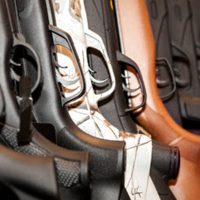Do Weapons Possession Cases Hold Up in Court?

No, unless the state proves the three Ps of possession beyond any reasonable doubt. Only this large amount of evidence overcomes the presumption of innocence in criminal cases. If weapons possession was a civil matter, two out of three Ps may suffice, because the burden of proof is much lower in civil court. But in criminal court, the state must do more than prove all three Ps. It must convincingly prove all three. No photo finishes or replay reviews are allowed.
To successfully resolve a weapons possession case, a Leesburg criminal defense lawyer doesn’t have to disprove the three Ps, or even disprove one of them. Instead, an attorney must only create a reasonable doubt. Most defense lawyers prepare weapons possession cases with the three Ps in mind. During pretrial settlement negotiations, if a Leesburg criminal defense lawyer can undermine even one, most prosecutors are ready to wheel and deal.
Produce the Item in Court
Before they can prove the defendant possessed an illegal item, the state must produce that item in court. Therefore, at the time of arrest, officers needed a valid search warrant. Alternatively, the state must prove a search warrant exception applied.
Valid search warrants are based on probable cause. The uncorroborated word of an unreliable informant is usually not probable cause. Furthermore, probable cause requires facts, not speculation based on a defendant’s behavior or certain suspicious circumstances.
Beginning in the 1960s, the Supreme Court carved out some exceptions to the Constitution’s search warrant requirement. Major exceptions in weapons possession cases include:
- Owner Consent: Owners or apparent owners may voluntarily consent to police searches. Owners are record owners. Apparent owners are people like roommates who aren’t on the lease or drivers who don’t own vehicles. Voluntary usually means 100 percent voluntary with no bullying.
- Plain View: If officers see contraband in plain view in cars, houses, or anywhere else, they may seize that property without a warrant. This exception only applies if officers were legally in that place at that time (i.e. the stop or other law enforcement contact was legal).
- Weapons Pat-Down: If officers reasonably believe that suspects in the field may be carrying weapons and may pose a danger (both things must be proved), they may pat these individuals down for weapons and confiscate any plain view contraband.
The exclusionary rule was the tradeoff for these exceptions. Before this rule, prosecutors could use illegally obtained items in court in some circumstances. Now, the judge must exclude such items. If the judge excludes the item, the case cannot go forward and collapses like a house of cards.
Prove the Item Was Illegal
Frequently, minor alterations transform legal weapons into illegal ones. Police officers cannot assume that a semi-automatic rifle has been modified to fully automatic, and so forth.
Additionally, the prohibited weapons list changes from time to time. The item must have been illegal at the time of arrest, not at the time of trial. On a related note, Virginia law prohibits weapons possession in certain places. These place designations are quite vague.
Finally, many add-ons, like silencers and large-capacity magazines, are illegal if attached to a gun. In most cases, the item itself is not illegal, nor is the gun next to it.
Prove Criminal Possession
In addition to close proximity, prosecutors must also establish actual knowledge and exclusive control. Therefore, a defendant could literally be sitting on an illegal weapon and not “possess” it for criminal law purposes (e.g. the defendant didn’t know a gun was under the seat).
Work With a Thorough Loudoun County Lawyer
There’s a big difference between an arrest and a conviction in criminal law. For a confidential consultation with an experienced criminal defense attorney in Leesburg, contact Simms Showers, LLP, Attorneys at Law. The sooner you reach out to us, the sooner we start working for you.
Source:
constitution.congress.gov/browse/essay/amdt14-S1-5-5-5/ALDE_00013763/
